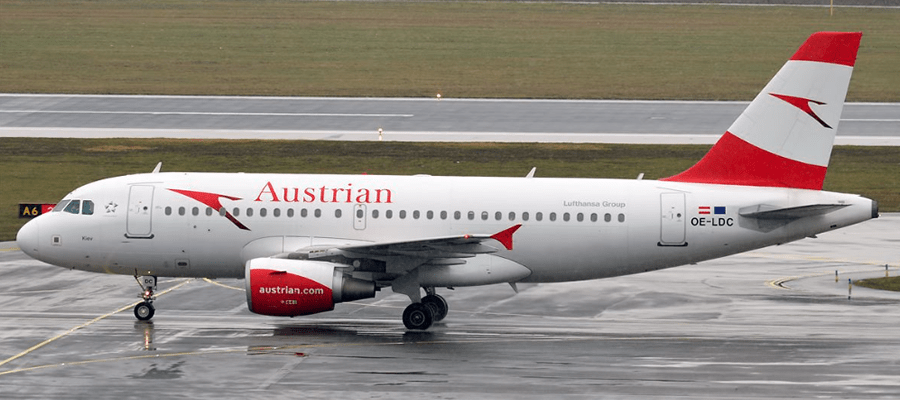Austrian Airlines states that it is repositioning itself in response to the glut of low-cost airlines at Vienna Airport, which may result in a loss-making situation due to the cheap flight offerings in Vienna. The company aims to reduce in-house costs by €90 million annually starting in 2021 via efficiency and productivity improvements. Some 700-800 jobs will likely be impacted by the “PE20” program. A large number of these job cutbacks will be absorbed via staff fluctuation. The long-term objective of the airline is to modernise its fleet and then once again return to a strong growth path.
“We have to reposition ourselves in order to survive the brutal competition of the low-cost airlines,” says Austrian Airlines CEO Alexis von Hoensbroech. “In part, the measures will be painful because they drain resources which we tediously built up over the past years. However, at the same time they are necessary in order to safeguard the future of Austrian Airlines as the leading airline in Austria.”
Austrian Airlines plans to bundle its fleet strength in Vienna with flights to Germany from Austria’s regional airports to be gradually taken over and operated by Lufthansa. In December the Salzburg-Frankfurt route will already be converted from an “OS” to a “LH” flight number, thus freeing up aircraft. The decentralised crew bases in the federal provinces will be shut down, and the affected employees will be given an offer to transfer to Vienna.
Austrian Airlines is also upgrading its fleet, with its 18 small turboprop aircraft being replaced by ten larger medium-haul, Airbus A320 aircraft, leading to considerable productivity improvements. The first of the additional A320 aircraft will already take off on behalf of Austrian Airlines in November.
“The replacement of the aircraft and the closer cooperation with our sister company Eurowings enables us to bundle our fleet strength in Vienna,”states CCO Andreas Otto. “We will not retreat a single millimeter and will maintain our premium strategy.”
Larger aircraft result in lower unit costs, while fleet harmonization eliminates costs for the separate training of pilots, flight attendants and technicians as well as the storage of spare parts.
“The harmonization of our fleet alone will enable us to make a significant contribution towards improving earnings,” says CFO Wolfgang Jani.
Austrian Airlines also plans improvements in corporate processes based on automation, digitalisation, centralisation and cutbacks in material and non-staff expenses. Productivity and process efficiency measures should save €90 million each year over the upcoming two years. “We want to calmly discuss this all with our Works Council,” according to plans announced by the Austrian Airlines CFO.
Starting in January 2020, Eurowings will operate four aircraft in wet lease on behalf of Austrian Airlines from its base in Vienna. In this way, the two airlines will be able to more closely coordinate their route offerings, enabling new direct flights to Barcelona, Birmingham, Nuremberg, Rome and Zadar to be added to the Austrian Airlines portfolio of destinations in its flight schedule. Austrian Airlines will no longer fly to Miami in the upcoming 2020 summer flight schedule. The route, which was only served on a seasonal basis in the summer months up until now, was no longer profitable despite all efforts, says the airline.
Flights on the Vienna-Los Angeles route, also only operated in the summer season, will be offered five times per week in the 2020 summer flight schedule instead of seven weekly flights up until now. The airline has not yet decided what will be done with its freed-up long-haul capacities.
“Our long-term strategy remains in full force. We want to modernize Austrian Airlines and make it profitable and investment-ready,” concludes CEO Alexis von Hoensbroech. “Investment-ready means that the company will able to finance the necessary investments on its own”.
The airline reported a steep decline for the last quarter. Adjusted earnings before interest and taxes (adjusted EBIT) fell to €17 million for the first three quarters of 2019 from €110 in the prior-year period. Investments in the fleet and service had a positive impact, as reflected in the six percent rise in passenger volume to a total of 11.2 million.
“We succeeded in attracting additional customers in despite of the competition from low-cost airlines,” states Austrian Airlines CFO Wolfgang Jani. “However, the glut of budget airlines in Vienna and higher jet fuel costs intensify pressure on ticket prices and thus on our earnings.”
Revenue in the first three quarters of 2019 fell by two percent to €1,696 million despite the passenger growth. Total operating expenditures rose by four percent to €1,679 million in the same period (Q1-3 2018: €1,620 million). The main reasons for the higher costs were the additional expenses for jet fuel and routine maintenance. Jet fuel costs rose by 14% or €47 million during the first nine months of the current financial year.
Austrian Airlines significantly expanded its traffic volume. In the first nine months, the airline transported 11.2 million passengers, comprising a year-on-year increase of 6% or about 600,000 passengers. The intercontinental business developed exceptionally well, with passenger volume up by about 7%. The flight offering in available seat kilometres (ASK) throughout the entire Austrian Airlines route network increased by three percent. Seat kilometres sold rose by five percent compared to the first nine months of 2018. Passenger load factor equalled 81.2%, a rise of 1.6 percentage points from the previous year. The number of flights operated by Austrian Airlines rose by four percent to a total of 106,165 since the beginning of the year.
Due to the strong competition from low-cost carriers, Austrian Airlines expects the entire year 2019 to be an economically difficult period. “We will once again fight for quality and customers in the fourth quarter but cannot rule out the possibility of reporting a loss for the entire 2019 financial year,” Austrian Airlines CFO Wolfgang Jani says. In 2018 Austrian Airlines still generated an adjusted EBIT of €83 million.

